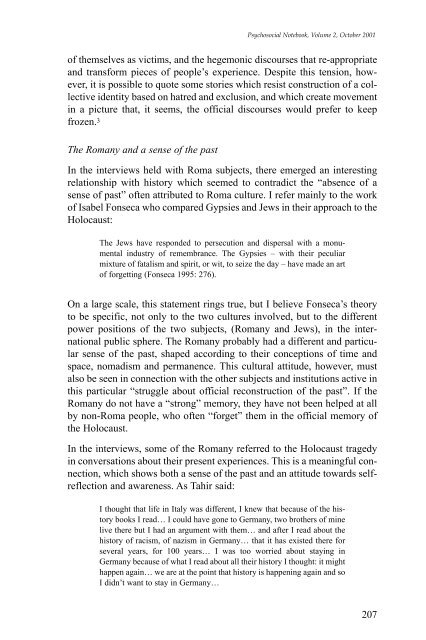Psychosocial Notebook - IOM Publications - International ...
Psychosocial Notebook - IOM Publications - International ...
Psychosocial Notebook - IOM Publications - International ...
Create successful ePaper yourself
Turn your PDF publications into a flip-book with our unique Google optimized e-Paper software.
of themselves as victims, and the hegemonic discourses that re-appropriate<br />
and transform pieces of people’s experience. Despite this tension, however,<br />
it is possible to quote some stories which resist construction of a collective<br />
identity based on hatred and exclusion, and which create movement<br />
in a picture that, it seems, the official discourses would prefer to keep<br />
frozen. 3<br />
The Romany and a sense of the past<br />
<strong>Psychosocial</strong> <strong>Notebook</strong>, Volume 2, October 2001<br />
In the interviews held with Roma subjects, there emerged an interesting<br />
relationship with history which seemed to contradict the “absence of a<br />
sense of past” often attributed to Roma culture. I refer mainly to the work<br />
of Isabel Fonseca who compared Gypsies and Jews in their approach to the<br />
Holocaust:<br />
The Jews have responded to persecution and dispersal with a monumental<br />
industry of remembrance. The Gypsies – with their peculiar<br />
mixture of fatalism and spirit, or wit, to seize the day – have made an art<br />
of forgetting (Fonseca 1995: 276).<br />
On a large scale, this statement rings true, but I believe Fonseca’s theory<br />
to be specific, not only to the two cultures involved, but to the different<br />
power positions of the two subjects, (Romany and Jews), in the international<br />
public sphere. The Romany probably had a different and particular<br />
sense of the past, shaped according to their conceptions of time and<br />
space, nomadism and permanence. This cultural attitude, however, must<br />
also be seen in connection with the other subjects and institutions active in<br />
this particular “struggle about official reconstruction of the past”. If the<br />
Romany do not have a “strong” memory, they have not been helped at all<br />
by non-Roma people, who often “forget” them in the official memory of<br />
the Holocaust.<br />
In the interviews, some of the Romany referred to the Holocaust tragedy<br />
in conversations about their present experiences. This is a meaningful connection,<br />
which shows both a sense of the past and an attitude towards selfreflection<br />
and awareness. As Tahir said:<br />
I thought that life in Italy was different, I knew that because of the history<br />
books I read… I could have gone to Germany, two brothers of mine<br />
live there but I had an argument with them… and after I read about the<br />
history of racism, of nazism in Germany… that it has existed there for<br />
several years, for 100 years… I was too worried about staying in<br />
Germany because of what I read about all their history I thought: it might<br />
happen again… we are at the point that history is happening again and so<br />
I didn’t want to stay in Germany…<br />
207

















